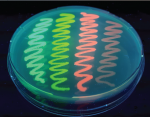Our lab develops, improves and compares genetically encoded fluorescent probes, that are inspired by Green Fluorescent Protein (GFP). We use the most optimal fluorescent proteins to generate biosensors for quantitative functional imaging with the overarching goal to unravel (G protein) signaling networks in time and space in cells and tissues. The majority of the genetically encoded tools that we have developped are shared through addgene. To simplify the quantification and presentation of data, we develop analysis tools and data visualization apps that are gathered here.
Scientific field: Cell biology, Molecular biology, Biophysics, Biochemistry, Biotechnology
Microscopy background: Probe Development, Image Analysis
Posted by Joachim Goedhart, on 4 October 2022

Posted by Joachim Goedhart, on 7 July 2020
